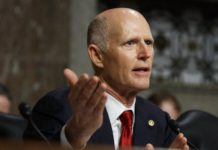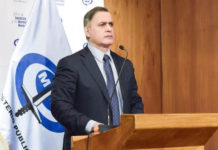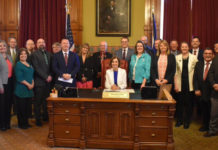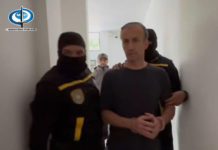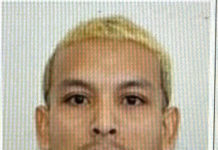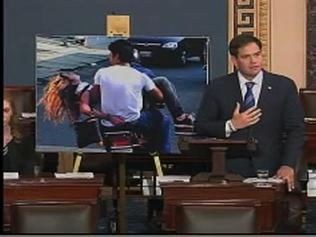
 El proyecto de Ley para la Defensa de DDHH y Sociedad Civil de Venezuela pide sanciones individualizadas. La iniciativa legal deberá ser aprobada primero por el Comité de Relaciones Exteriores del Senado antes de ser sometido al pleno de esa cámara.
El proyecto de Ley para la Defensa de DDHH y Sociedad Civil de Venezuela pide sanciones individualizadas. La iniciativa legal deberá ser aprobada primero por el Comité de Relaciones Exteriores del Senado antes de ser sometido al pleno de esa cámara.
“La situación de inestabilidad en Venezuela ilustra claramente que el abatimiento de la democracia conduce al caos político y a la inestabilidad económica. Esta legislación deja muy claro que la violencia del régimen de (el presidente venezolano Nicolás) Maduro exige una respuesta potente y rápida”, dijo Menéndez, presidente del Comité de Relaciones Exteriores de la Cámara alta.
El senador demócrata reiteró que “dada la impunidad desbocada en Venezuela”, Estados Unidos no se quedará de brazos cruzados frente “a las violaciones de derechos humanos en Caracas y en todo el país”.
“Esta legislación sirve como una fuerte advertencia a los miembros del Gobierno, las fuerzas de seguridad venezolanas y grupos civiles armados implicados en la violencia, de que Estados Unidos no tolera este tipo de conducta y en consecuencia responderá para ayudar a fortalecer a la sociedad civil venezolana, mientras se aplican sanciones específicas contra los individuos responsables”, sentenció.
Bajo el nombre de “Ley para la Defensa de los Derechos Humanos y Sociedad Civil de Venezuela”, el proyecto sigue el marco delineado por la resolución presentada por Menéndez y Rubio días atrás y que el pleno de la Cámara alta aprobó este miércoles.
La iniciativa legal deberá ser aprobada primero por el Comité de Relaciones Exteriores del Senado antes de ser sometido al pleno de esa cámara, y en caso de ser respaldada, deberá ser aceptada también por la Cámara de Representantes para que entre en vigor tras su firma por el presidente Obama.
El Congreso estará en receso la próxima semana, por lo que el texto legislativo no será considerado previsiblemente hasta finales de mes.
Venezuela registra desde hace un mes protestas contra el Gobierno de Nicolás de Maduro en las que se han vivido episodios de violencia que han causado la muerte de hasta 28 personas, según han confirmado fuentes oficiales.
Washington de momento ha instado a un diálogo entre Gobierno y oposición, pero ante la falta de acuerdo el secretario de Estado, John Kerry, aseguró que se reserva la opción de imponer sanciones a Venezuela o invocar la Carta Democrática Interamericana de la OEA en caso de que no se logre poner fin a la violencia.
RUBIO, COLLEAGUES INTRODUCE THE VENEZUELA DEFENSE OF HUMAN RIGHTS AND CIVIL SOCIETY ACT
Legislation Strengthens Venezuelan Civil Society, Calls for Targeted Sanctions in Response to Grave Violations of Human Rights and Fundamental Freedoms
Thursday, March 13, 2014 Washington, D.C. – As members of the Senate Foreign Relations Committee, U.S. Senator Marco Rubio (R-FL) and Committee Chairman Robert Menendez (D-NJ), along with Senator Bill Nelson (D-FL), today introduced the Venezuela Defense of Human Rights and Civil Society Act of 2014.
This bipartisan legislation authorizes $15 million in new funding in the FY2015 budget to defend human rights, support democratic civil society organizations, assist independent media, and strengthen good governance and the rule of law in the face of the massive violence and repression being carried out by President Maduro against peaceful protesters.
It also requires President Obama to impose sanctions on persons that have been involved in serious human rights violations against peaceful demonstrators and others in Venezuela, or that have directed or ordered the arrest or prosecution of a person due to their legitimate exercise of freedom of expression or assembly.
Yesterday, the U.S. Senate unanimously passed a resolution introduced by Rubio outlining the framework for legislative action on Venezuela.
“The full U.S. Congress has spoken loudly and clearly that we stand with the Venezuelan people as they exercise their fundamental rights, and we condemn the Maduro regime’s deadly wave of repression,” said Rubio. “Now it’s time for actions that name, shame and punish the Maduro regime’s murderers and thugs who are responsible for the crackdown against innocent Venezuelans.
“Now is the time to stand with the Venezuelan people and increase pressure on the Maduro regime,” added Rubio. “I hope we can begin to move quickly to consider this legislation when the Senate reconvenes on March 24.”
Venezuela Defense of Human Rights and Civil Society Act of 2014
Section 1. Short Title: Venezuela Defense of Human Rights and Civil Society Act of 2014.
Section 2. Findings: This section presents key findings regarding Venezuela’s growing economic crisis; alarming levels of criminal violence; and erosion of democratic governance, freedom of expression and freedom of the press.
Section 3. Sense of Congress: This section states that it is the sense of the Congress that 1) the United States seeks a mutually beneficial relationship with Venezuela based on respect for human rights and the rule of law, and a productive relationship on issues of public security, including counternarcotics and counterterrorism; 2) that the Government of Venezuela is responsible for the chronic mismanagement of its economy, the levels of violence in the country, and for undermining democratic governance; and 3) these crisis conditions prompted the demonstrations taking place throughout Venezuela.
Section 4. U.S. Policy Towards Venezuela: This section recognizes that it is the policy of the United States to 1) support the democratic aspirations of the Venezuelan people as defined under the Inter-American Democratic Charter; 2) work in concert with the members of the Organization of American States – as well as the European Union – to ensure the immediate end of violence against protesters and a peaceful resolution of the current crisis in Venezuela; and 3) hold accountable government and security officials responsible for or complicit in the use of force against antigovernment protestors.
Section 5. Sanctions on Persons the President Determines Are Responsible for Violence in Venezuela: This section requires the President to impose sanctions on persons that he determines 1) have perpetrated, ordered or directed significant acts of violence or serious human rights abuses in Venezuela against persons associated with the antigovernment protests in Venezuela, including current and former officials of the Government of Venezuela or 2) have directed or ordered the arrest or prosecution of a person primarily because of the person’s legitimate exercise of freedom of expression or assembly. Sanctions to be imposed by the President would include 1) asset blocking – using all powers granted to the President by the International Emergency Economic Powers Act to block and prohibit all transactions in property; and 2) exclusion from the U.S. and revocation of visas– denying visas, excluding from the United States, and revoking visas and other documents in accordance with the Immigration and Nationality Act.
Section 6. Support for Civil Society in Venezuela: This section authorizes $15 million in new funding in FY2015 to 1) defend human rights, 2) build the capacity of democratic civil society, 3) support independent media outlets and unrestricted access to the internet, 4) improve government transparency and accountability, and 5) assist civil society activists, journalists and protesters that have been targeted for their activity.

